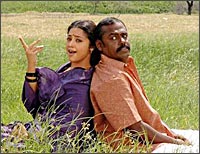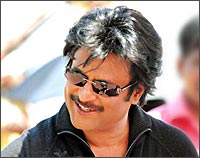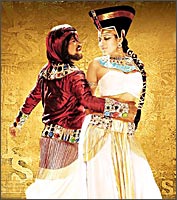The theatre is filled with an electric hush, as exhilarated fans wait with bated breath to see their star. Screams fill the air as the star's name appears onscreen.
Yes, the most awaited Rajinikanth movie of the year is finally out amidst enormous fanfare, news-generating frenzy and shrieking fans who daren't expect such a treat before Robot.
-
Also Read: Showcasing Kuselan
The question is whether the Tamil film, Kuselan, produced by Kavithalaya and Seven Arts Production, justifies all the hype. Well, let us find out.
The opening credits do a good deal to raise expectations, as the camera lovingly caresses the instruments of a barber, telling his life history in these meagre tools of his employment.
The scene is Maraiyur, a tiny village that houses the hard-working Balu (Pasupathy), who struggles to eke out an honest living with wife Sridevi (Meena) and their three children. Unable to even buy a treasured revolving chair, Balu gets thrown out of the government office, is berated by his friends and mocked by the village's landlords (a large troop consisting of Livingstone, M S Bhaskar, Vaiyapuri and Co) in quick succession. Nothing fazes him, though. He's quite content with what he has, despite the antics of his competitor Salon Shamugam (Vadivelu), who makes a bombastic living by forcing locals to come to him for a shave.
 Amidst the neighbours' ridiculous heckling, Balu stays relatively calm even as his children are thrown out of the local school (Gita is the headmistress and nun) for non-payment of fees. But this calm is shattered with the arrival of an arrogant Nagercoil Nagaraj (Santhanam), who flings currency all over the place and announces this piece of stunning news: there's going to be a film shooting, and guess who is coming? The Superstar!
Amidst the neighbours' ridiculous heckling, Balu stays relatively calm even as his children are thrown out of the local school (Gita is the headmistress and nun) for non-payment of fees. But this calm is shattered with the arrival of an arrogant Nagercoil Nagaraj (Santhanam), who flings currency all over the place and announces this piece of stunning news: there's going to be a film shooting, and guess who is coming? The Superstar!
The superstar, Ashok Kumar (Rajinikanth) arrives amidst much fanfare, sporting numerous costumes from Zorro to snatches of his old roles. His arrival transforms Maraiyur into a dream-world and throws the whole village in a frenzy.
Huge sets are put up for Chandramukhi 2, as Nayanthara (playing herself) sizzles and struts around in skimpy costumes. The production crew runs everyone ragged and the locals themselves can hardly get a glimpse the star who is surrounded by Black Cats.
Meanwhile, news floats around that Balu and Ashok Kumar were childhood friends. Now everyone wants to cash in on this fact. As the entire village surrounds him with favours, Balu is caught between two agonizing questions: How could he possibly approach the great Ashok Kumar? And even if he did, would the star remember and help him out?
As far as the acting chops go, Pasupathy comes out the winner. In this remake of the Malayalam hit Kadha Parayumbol, it's easy to see the scenes where writer Sreenivasan's originality must have shone in the form of dialogues. As Pasupathy says, "We can't afford a good night's sleep, let the lamps at least have that luxury. Switch them off," you enjoy those rare bits of poetic portrayal.
Meena tries hard to re-create the original version's magic, but perhaps she has been told to over-do it for Tamil: she wears lipstick and pastel shades of saris for every other scene, while trying to prove that they have no idea where the next meal's going to come from. Still, she does make an impact when she spins tall tales about her husband's friendship with the star, trying desperately to rise above their squalor. Her love for her husband is a rare and beautiful thing to see.
 But the star of the show is undoubtedly Rajnikanth all the way. He might be Ashok Kumar in name but everything, right from the extravagant Cinema Cinema song caters to Rajnikanth, as fans perform milk abishekam and throw confetti at his name (a gaffe the director could have avoided, as 'Rajni' appears in block-letters). With a zed-category security just for him, he is the real star as he waves to ecstatic fans, even allowing a gypsy crowd in his fold (here the playful and accommodating star bit is little too good to be true).
But the star of the show is undoubtedly Rajnikanth all the way. He might be Ashok Kumar in name but everything, right from the extravagant Cinema Cinema song caters to Rajnikanth, as fans perform milk abishekam and throw confetti at his name (a gaffe the director could have avoided, as 'Rajni' appears in block-letters). With a zed-category security just for him, he is the real star as he waves to ecstatic fans, even allowing a gypsy crowd in his fold (here the playful and accommodating star bit is little too good to be true).
As for the script, the freshness of the original has been denuded a little to accommodate dialogues that extol the many virtues of the superstar. A few cameos -- director Sunderrajan, who for one comes right out and ask the star certain very shocking questions like, Why does the star disappear so often to the Himalayas? Why does he keep everyone guessing about his political stance? -- are interesting.
As the theatre erupts in surprise and faint disapproval, the superstar manages to answer the barrage of questions in his own inimitable style. It works a bit mainly because of Rajni's popularity. Stars like Prabhu (who appears with his Chandramukhi name) peep in briefly, doing their bit to raise the star-power.
Nayanthara could easily give the Shreyas and Trishas of this world a run for their money in a bid to bare all. The camera focuses lovingly on her, and you wonder if this was really the demure girl of Ayya.
Vadivelu easily steals the comedy bits as the persevering village idiot who desperately wants a photograph with the star. His antics are the ones that really make you grin.
 The rest -- Manobala, M S Bhaskar, Livingstone and Vaiyapuri -- are absolutely wasted. These are all actors who have proven themselves as excellent performers in numerous other films, and have now been ruthlessly sacrificed in a bid to make the superstar assume gigantic heights. It's pathetic to see such consistent silliness.
The rest -- Manobala, M S Bhaskar, Livingstone and Vaiyapuri -- are absolutely wasted. These are all actors who have proven themselves as excellent performers in numerous other films, and have now been ruthlessly sacrificed in a bid to make the superstar assume gigantic heights. It's pathetic to see such consistent silliness.
But it is director P Vasu's script that must shoulder the responsibility of how Kuselan has ultimately turned out. Everything, a la Chandamukhi, is life-size, starting from the star to the travails of the barber.
It reminds you of the movies of the 60s and the only saving grace is the original story, which pulls the screenplay from descending into nothing. The climax -- particularly the last twenty minutes makes up for the dragging first half -- and induces real emotion. There was hardly a dry eye in the theatre during the truly wonderful ending.
G V Prakash's music fulfils a Rajni-starrer's expectations: the Cinema Cinema song, dedicated to 75 years of Tamil cinema comes out well. Chinnamma is melodious, while Nayanthara's Chaaral oozes sexiness.
Padmashree Thotta Tharani has understood what he ought to provide and has created a suitably ramshackle hut, while constructing a truly enormous guesthouse for the stars.
So what is the verdict? Yes, the script falls flat at times, while the movie pulls you into two extremes -- Rajini's many extraordinary merits and Pasupathy's warm-hearted honesty.
Obviously Pasupathy works more effectively but Rajini's star status is unquestionable. If only the dialogues and screenplay had been more effective and subtle.
In the end, it's a definite treat for Rajni fans. For the others? The last twenty minutes will do.
Rediff Rating: 






 © 2025
© 2025